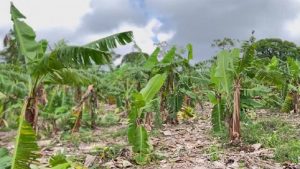 The Grenada government says it will begin paying out an estimated EC$10 million (One EC dollar=US$0.37 cents) to farmers and other agricultural stakeholders on the mainland, who were adversely affected by the passage of Hurricane Beryl on July 1.
The Grenada government says it will begin paying out an estimated EC$10 million (One EC dollar=US$0.37 cents) to farmers and other agricultural stakeholders on the mainland, who were adversely affected by the passage of Hurricane Beryl on July 1.
The category four storm had caused widespread damage on Petite Martinique and Carriacou as well as on mainland Grenada. The authorities have said that the damage could run into millions of dollars.
In a statement, the Ministry of Agriculture and Lands, Forestry and Marine Resources said the Livelihood Incentive Payments were being made to farmers and other stakeholders from the start of this month.
“Government’s financial commitment was initially estimated at EC$19.1 million dollars, but due to the overwhelming response from affected stakeholders, that sum is expected to be significantly higher,” the ministry said.
Agriculture and Lands, Forestry and Marine Resources Minister, Lennox J. Andrews, said, “We are indeed satisfied that the necessary due process was properly handled and are happy that payment is finally rolling out.”
The ministry said that the government’s support to farmers and other stakeholders will be paid out in tranches and will be disbursed via banks, credit unions and district offices.
It said farmers owning more than five acres of land who sustained damage will receive a one-off income support payment of EC$9000, while farmers with less than five acres will receive a one-off payment of EC$4500.
The ministry said that it is assuring farmers that remaining payouts will be made in the coming weeks and that payments will be made to the Grenada Cooperative Nutmeg Association and the Grenada Cocoa Association as well as Fisherfolk
It said payment to farmers in Carriacou and Petite Martinique will commence soon.
“We had several instances of account numbers not matching names, and this had to be verified and corrected,” said Isaac Bhagwan, the permanent secretary in the ministry of agriculture and lands, forestry and marine resources, who noted that delays in the process were largely due to insufficient, and sometimes incorrect information submitted by beneficiaries
